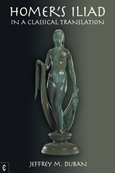
The Iliad presents superhuman heroes and superhuman rage, brutal death, unbounded sorrow, the craving for revenge, the shortness of life, the glory quest, and, ultimately, reconciliation and forgiveness. As human nature is unchanging, the Iliad’s themes concern us as much today as they did Homer’s audiences 2,700 years ago. Not for nothing did Ezra Pound observe that “a civilization was founded on Homer.”
The Iliad is always relevant, even as it is timeless. Of interest to readers in every generation, it is a classic in the root sense. Homer was “the Bible of the Greeks.” He was their mythology and history (still fairly merged at the time), their religion, their storehouse of ethics and exempla under an Olympian dispensation. And while the Odyssey is the more popular of Homer’s epics, the Iliad is the more profound.
This is not merely another new translation of Homer’s Iliad. It is sooner and foremost Homer’s Iliad in a Classical Translation – the first-ever into a consistently 12-syllable line and, at the same time, the longest such work in the English language (the Iliad consisting of 15,639 lines in Greek). This translation by Jeffrey M. Duban uses a mildly archaizing style and other poetic devices to suggest the antiquity and flavor of Homeric composition. Like the original, it is both alliterative and polysyllabic – excessive monosyllabism the scourge of many a modern translation. Duban further observes epic decorum with recourse to poetic diction. Decorum entails the avoidance of colloquialisms and commonplaces, again in contrast to other translations.
“Through its masterful deployment of archaism, inversion, elevated diction, and other techniques of aesthetic distanciation, Duban’s uniquely metered rendering re-Homerizes the Iliad, as it were, casting its remoteness and peculiarity into sharp relief.” – Robert Pogue Harrison, Rosina Pierotti Professor in Italian Literature, Stanford University, Author, The Body of Beatrice (1988)
“While Homer’s style can be plain and direct, it is also often very grand and even, at times, ornate. You will find plainness in many modern translations of Homer, but you will likely search in vain for elevation. In his spirited rendering of the Iliad, Jeffrey Duban aims high. Through a carefully crafted use of heightened poetic diction and a consistent metrical formalism, Duban offers us, in English verse, a singular version of Homer’s epic poem.” – Steven Shankman, University of Oregon, Author, Pope’s Iliad: Homer in the Age of Passion (1983), Editor, Pope’s Iliad (Penguin ed., 1996)
“Like the campfires scene concluding Book 8, Duban’s Iliad, with the antique luster of burnished bronze, glints smartly across the plain. Think what you will of the contemporary or ‘new’ translations a’flood the market, this one, classically conceived and executed, is special. Duban does not merely translate but conveys his vision for the Iliad.” – C. J. Mackie, La Trobe University, Author, Rivers of Fire: Mythic Themes in Homer’s Iliad (2008)
JEFFREY M. DUBAN, an ardent classicist, art devotee, and classical music presenter, grew up in Boston, where he attended the prestigious Boston Public Latin School. He began studying Latin in the seventh grade and Greek in the tenth, followed in college by Old Testament Hebrew and Sanskrit. A graduate of Brown University, he obtained his Ph.D. in classics from The Johns Hopkins University and briefly entered university teaching.
Changing course, he earned his J.D. from Fordham University and, for the next 22 years, devoted himself to defending academic freedom in college settings large and small. Upon retirement he returned to his first love, Ancient Greek, publishing The Lesbian Lyre (2016) and The Shipwreck Sea (2019). Inspirational visits to the Greek islands of Lesbos, Chios, Syros, and Crete further cemented his determination to translate the Iliad classically, critically, free of colloquialisms, and truer to Homer’s own idiom and elevated diction. Jeffrey’s varied musical interests have also led to a collaboration with contemporary Greek-Canadian composer, Constantine Caravassilis, on his double album From Sappho’s Lyre. In addition to liner notes, commentary, and translations of Sappho, the album includes “5 Duban Songs” set to Jeffrey’s own poetry appearing in The Shipwreck Sea. Jeffrey and his wife, Jayne, his beloved editor and collaborator, live in New York City.
Published in the UK by Clairview Books, 5 May 2025
£22.50; 672pp; 23.5 x 15.5 cm; hardback; ISBN 9781912992652
